|
|
|
Sort Order |
|
|
|
Items / Page
|
|
|
|
|
|
|
| Srl | Item |
| 1 |
ID:
192923
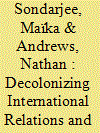

|
|
|
|
|
| Summary/Abstract |
Over the past decade, there has been a new “decolonial turn,” albeit less related than before to land and political independence. “To decolonize” is now associated with something less tangible and often under-defined. We argue that scholars, especially Western ones, should avoid depoliticizing the expression “decolonizing” by using it as a buzzword. Scholars and policymakers should use the expression only if it is closely related to the political meaning ascribed to it by Global South and Indigenous activists and scholars. Decoloniality is a political project of human emancipation through collective struggles, entailing at least the following: 1) abolishing racial hierarchies within the hetero-patriarchal and capitalist world order, 2) dismantling the geopolitics of knowledge production, and 3) rehumanizing our relationships with Others and nature. We conclude that there is a need for epistemic humility and that Western scholars and institutions must refrain from using the word too freely.
|
|
|
|
|
|
|
|
|
|
|
|
|
|
|
|
| 2 |
ID:
192931
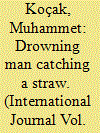

|
|
|
|
|
| Summary/Abstract |
In the mid-2010s Turkey-Russia relations gained a strategic dimension after the two nations began to work together in Syria and took bold steps to cooperate on defence and nuclear energy. This development was commonly regarded as a major shift in Turkish foreign policy. This article argues that the context in which the Turkey-Russia nexus operates is historically rooted. Since the nineteenth century, Russia almost has been the most critical threat to Turkey; and Turkey consistently sought to moderate this threat, mostly with Western assistance. But when Turkey either failed to subdue Russia or there was no significant threat, it would opt for rapprochement with Russia. An examination of the historical background of Turkey-Russia relations helps explain these nations’ contemporary dynamics with one another.
|
|
|
|
|
|
|
|
|
|
|
|
|
|
|
|
| 3 |
ID:
192922


|
|
|
|
|
| Summary/Abstract |
The world of International Relations (IR) has expanded far beyond its initial disciplinary boundaries. Originally defined as a complement to Political Science's “within state” focus and with a clearly defined mission (how to explain inter-state behavior in order to understand and avoid war), today it is actually quite difficult to say with confidence what isn’t IR.1 Equally vexing is the question of how to study it2 or whether to study it at all.3 From the era of the so-called “Great Debates” to inter-paradigm debates,4 to more recent attempts to reconceptualize the discipline as “global IR”5 or “world IR,”6 to de-world it7 or “queer” it,8 it sometimes appears that critical scholars are engaged in an endless attempt to get the mainstream to pay attention. The mainstream may be defined as those scholars and practitioners of IR, Development Studies, and International Political Economy who pursue a state-centric framework of analysis whose bounded theoretical domain is the interactions among sovereign states in an anarchical world system.9 At best, this framework allows for other actors—corporations, financial institutions, civil society organizations, individuals—to be added in. But make no mistake, this is a world of states whose (dis)order is made by states acting in the “national interest.”
|
|
|
|
|
|
|
|
|
|
|
|
|
|
|
|
| 4 |
ID:
192929
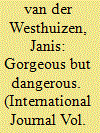

|
|
|
|
|
| Summary/Abstract |
How do deeply unequal cities in the Global South project soft power, and what are the tensions and contradictions that emerge when they do? Cities’ strategies to enhance their international appeal can be gauged through three interlocking or complementary approaches: first, leveraging the strategic value of events and associated services; second, developing iconic architecture and mega-projects; and third, making themselves attractive to the so-called “creative class.” Drawing on a brief comparative analysis of Rio de Janeiro and Cape Town, these strategies are assessed in relation to the dynamics of soft power and soft disempowerment. Although Rio de Janeiro and Cape Town share formidable resources to generate soft power, their societal complexities of crime and violence cast a heavy disempowering shadow on their innovative soft power strategies.
|
|
|
|
|
|
|
|
|
|
|
|
|
|
|
|
| 5 |
ID:
192925
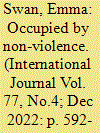

|
|
|
|
|
| Summary/Abstract |
Liberal peacebuilding has had its fair share of critiques. Along with highlighting its neo-liberal and Western-centric foundations, scholars have also drawn attention to its disregard for Indigenous peace frameworks. Peacebuilding in Palestine is no exception. Based on ethnographic research in the West Bank, this paper examines Orientalist narratives of Palestinian men embedded within the liberal peacebuilding framework and highlights the way that men engaged in unarmed resistance have navigated this terrain through the adoption of public transcripts which (re)narrate the Palestinian story/experience. I argue that this adoption can be interpreted as an act of critical agency where the silencing of their own beliefs is turned on its head to empower and further their agenda and goals. In this way, representation, knowledge, and silence can be understood as not only tools of colonial control, but also tools for Indigenous resistance to Western discourses, narratives, and representations.
|
|
|
|
|
|
|
|
|
|
|
|
|
|
|
|
| 6 |
ID:
192924
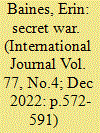

|
|
|
|
|
| Summary/Abstract |
Breaking the silence around wartime sexual violence is often understood as paramount to ending it. Many survivors feel compelled to publicly testify to prevent future harms, contest denial, and hold perpetrators to account. Yet, testimony is not always spoken, and silence should not be elided with powerlessness. In this article, we conceptualize the space in-between silence and voice as a form of multi-modal testimony that is given to protect, sustain, and reimagine relationships. We consider this in relation to the efforts of Adok, a woman abducted and forced into marriage by a rebel group in northern Uganda. Following her escape and return home with two children, Adok faced what is described as the “secret war”: ongoing structural and lateral violence. Her efforts to hold the father of her children to account attests to the “secret war,” and calls for a collective response to protect the future of her children.
|
|
|
|
|
|
|
|
|
|
|
|
|
|
|
|
| 7 |
ID:
192927


|
|
|
|
|
| Summary/Abstract |
In this article, I examine one book, seven edited volumes, and twenty-four Canadian Foreign Policy course outlines to assess the inclusion of women scholars, feminist research, Indigenous scholars, and Indigenous-themed research. As we will see, the degree to which “silences have been broken” is strikingly uneven. Indigenous scholars are rare in the field and the inclusion of work by Indigenous scholars is also rare. The extent of inclusion of women scholars in edited volumes is varied, as is the representation of women scholars in readings found in course outlines. Some texts and course outlines show that the silences have been broken. However, through whose work they include, some textbooks and course outlines suggest that the work of women scholars remains marginal to the field, that Indigenous content is of little relevance, and in some cases, the work of Indigenous and female scholars is neither heard nor seen.
|
|
|
|
|
|
|
|
|
|
|
|
|
|
|
|
| 8 |
ID:
192930


|
|
|
|
|
| Summary/Abstract |
Processes of making, sustaining, reforming, and un-making world orders are constants in global politics and development. Understood in the neo-Gramscian tradition pioneered by Robert Cox, ideas, institutions, and material capabilities combine to shape the range of possibilities for more and less stable orders. Sports mega-events (SMEs)—most prominently, the Olympic Games—have played an underappreciated role in this process. This paper examines the ways in which the Olympics manifested and supported the rise of globalized neoliberal hegemony in the early 1980s, the reconfiguration and erosion of this order through the 1990s and 2000s, and efforts to fundamentally revise this order in the new millennium. Particular emphasis is placed on the dual role of SMEs and the Olympics as manifestations of conspicuous consumption and the pursuit of prestige on the one hand, and as focal points for sanctions campaigns and boycotts on the other.
|
|
|
|
|
|
|
|
|
|
|
|
|
|
|
|
| 9 |
ID:
192926
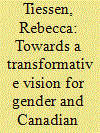

|
|
|
|
|
| Summary/Abstract |
In this paper, we consider the role of “feminist inside activists” in shaping the Canadian international policy landscape and provide examples of how government employees have actively promoted feminist and gender equality priorities. Specifically, this paper advances our understanding of how policy translates into action, and the transformative potential of agents of change in gender equality and feminist policy-making within Canada’s international policy machinery. Building on studies that identify the significant contributions of mid-level government employees who fight to keep gender equality a priority in government programming, we explore these contributions in the context of inside activism, documenting the significance of the work of both senior and mid-level government officials in advancing feminist policies and priorities. As an agency-focused analysis, this study complements and builds on critical feminist analyses of structural and systemic inequality.
|
|
|
|
|
|
|
|
|
|
|
|
|
|
|
|
| 10 |
ID:
192928


|
|
|
|
|
| Summary/Abstract |
This essay offers a narrative history, though certainly not definitive, of punk in South Africa. Rather than an ethnographic study or a history of popular culture, the essay places this narrative firmly within the academic fields of Political Science, International Relations, and International Political Economy. The story of punk in South Africa also illustrates the tensions and contradictions within the multiple, complex circuits and processes in play in formal and informal realms of everyday life that are central to, but often ignored, by the field of International Relations. The narrative of punk in South Africa is offered as a corrective to the disciplines’ Western-centrism and places people at the centre of scholarly analysis.
|
|
|
|
|
|
|
|
|
|
|
|
|
|
|
|
|
|
|
|
|